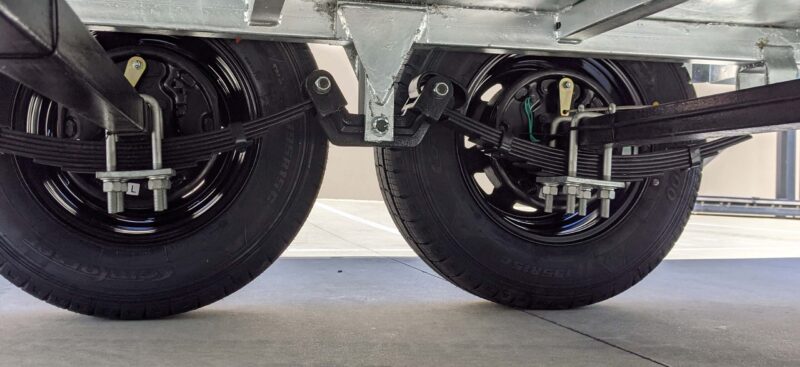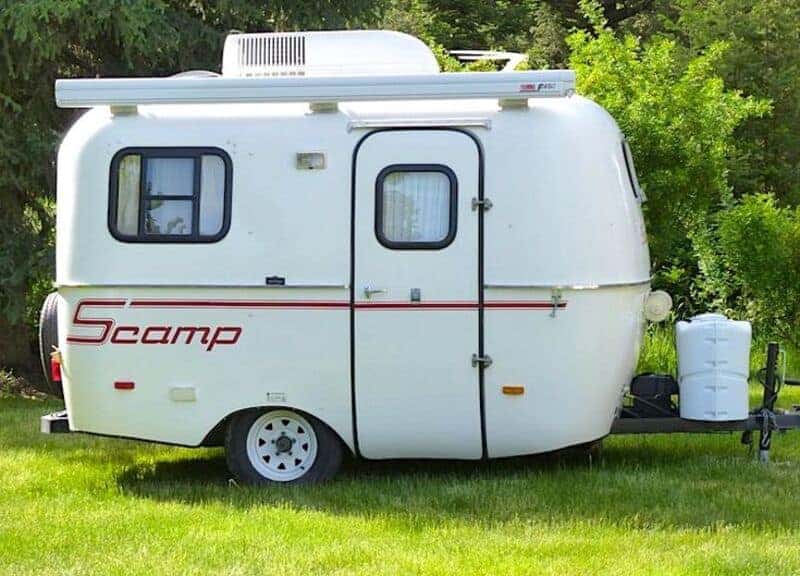Welcome to our comprehensive guide, “25 Campground Rules Everyone Should Follow.”
As you all know, Susan and I have been RV camping for years in our Class C and Class A motorhomes. Susan started RV camping as a child and, as an adult, took her own kids camping in her popup camper and travel trailer.
When we think of camping, we often conjure images of wide-open spaces, serene forests, and starlit skies. It’s a chance to reconnect with nature and escape from the hustle and bustle of daily life.
But as idyllic as this image may be, the reality of camping, particularly in a communal campground, can sometimes be less than perfect. One of the most common problems campers face is a need for more awareness of basic campground etiquette.
Just like living in a community, there are unwritten rules that, when followed, make the experience pleasant for everyone involved. When people disregard these rules, it can lead to conflicts and spoil the fun for everyone.
That’s why we’ve compiled this list of 25 cardinal rules every camper should follow.
These guidelines aren’t just about maintaining peace and harmony in the campground. They’re about respecting the environment, the wildlife, and the rights of other campers.
Why Do Campgrounds Have So Many Rules?
At first glance, the long list of rules at a campground may seem overwhelming or even unnecessary.
The campground carefully crafts rules to ensure safety, keep everyone happy, and protect property.
Safety is paramount in any communal setting, and campgrounds are no exception. Many rules you encounter ensure everyone has a safe camping experience.
The regulations comprise rules on lighting fires, speed limits in the campground, restrictions on specific equipment, and guidelines on interacting with local wildlife.
Such rules aren’t just for the benefit of individual campers; they aim to create a safer environment for everyone.
Then there’s the matter of happiness.
A campground often hosts a diverse mix of people, each with their own expectations and definitions of what makes up a good camping experience.
Some campers seek tranquility and solitude, while others view it as a social event filled with activities and noise.
Campground rules help balance these differing desires to ensure all campers enjoy their stays. For instance, RV Parks and campgrounds typically enforce quiet hours to guarantee those seeking rest can do so undisturbed.
Designated areas are available for activities that allow people to have fun and play games without disturbing others.
Last, the rules protect property. These rules include both the campground’s property and that of the campers.
Guidelines on where to park, how to dispose of trash correctly, and which areas are off-limits are all aimed at preventing damage to the campground’s facilities and preserving its natural beauty.
What Happens If You Don’t Follow Campground Rules?
Camping is an opportunity to immerse yourself in nature and escape the routine of daily life. But remember, every campground has its own set of rules and guidelines to ensure everyone’s safety and enjoyment.
But what exactly happens if you disregard these rules?
If you break the rules at a campground, you typically receive a warning initially to rectify your behavior and adhere to the guidelines. However, you could lose your site if you persistently ignore the rules. This would mean packing up and leaving, which could dampen your camping trip.
The owners have the prerogative to create and enforce their own rules for privately owned campgrounds. If you flout these rules, they could ask you to leave immediately, sometimes without warning.
Federal and state authorities govern federal and state parks. These officials have the mandate to enforce the park rules.
If you don’t comply, you could face dire consequences, including hefty fines, citations, or even being banned from the park.
25 Campground Rules Everyone Should Follow
Camping is a popular way to escape everyday life and enjoy nature’s beauty. However, to ensure outdoor adventures remain safe and enjoyable for all, there are specific rules everyone should follow.
These guidelines foster a sense of community among campers, protect the environment, and maintain the overall integrity of the campground.
The following section will explore “25 Campground Rules Everyone Should Follow.” We developed this list after RV camping at numerous campgrounds over the past five years.
From respecting wildlife to maintaining noise levels and managing waste appropriately, these rules cover all aspects of responsible camping.
Adhering to these regulations enhances your camping experience and helps preserve these natural spaces for future adventurers.
Let’s get started!
1. Respect Other Campers Space
Camping is a communal experience, yet it’s important to remember everyone has their own personal space.
Remember when your neighbor might have disturbed you by crossing your yard without permission? Did it feel intrusive?
Here’s a personal example. We were camping near Ocean City, Maryland and we had several people cut through our campsite and our neighbor’s campsite. Our neighbor became so upset he actually taped off his entire campsite with yellow caution tape to keep people from cutting through. While it was effective, it ruined the view of the beach where we were camping!
The same principle applies when camping. Each site is a temporary home for campers, and respecting boundaries is crucial for maintaining harmony.
Always avoid walking through other campsites, even if it’s a shortcut to the restroom, or the beach.
2. Keep Your Site Clean
Maintaining cleanliness at your campsite is not just about aesthetics; it’s also about safety and respect for nature.
A story of a camper who left food scraps around their site comes to mind. This attracted wildlife, which caused a disturbance and posed a potential danger to them and other campers.
Cleaning up after yourself helps prevent such incidents.
Remember, “Leave No Trace” isn’t just a mantra; it’s an essential camping practice.
My Dad always thought me and my brothers to leave our campsite better than we found it. If we all followed my Dad’s advice, we would all have nice clean campsites.
3. Completely Extinguish Fires

Fire management is a severe matter of camping.
There’s a tale of a family who thought they had extinguished their campfire before falling asleep, only to wake up to the crackling sound of flames.
Thankfully, they put it out in time, but the incident is a stark reminder of the importance of completely extinguishing fires. Make sure the fire is out cold before leaving it unattended.
Susan and I actually place a bucket under our RV to catch the air conditioner condensation when it drips off the roof. We then used this water to dowse our fire each evening.
We use a propane fire pit now, but the principle is still the same. Keeping everyone safe and preventing potential forest fires is essential.
4. Don’t Burn Trash
Burning trash isn’t just a smelly annoyance; it’s also a serious environmental concern.
Many materials release harmful chemicals when burned, harming the local ecosystem and fellow campers.
It’s important to remember a campsite isn’t a personal incinerator. Always dispose of your trash correctly, using designated waste bins or taking it when you leave.
5. Control Your Pets
Pets can bring joy to any camping trip, but it’s crucial to remember that not every camper is a pet lover. Uncontrolled pets can cause disturbances, from barking at night to scaring off wildlife.
Just as you wouldn’t let your pet run wild in a restaurant or a store, the same applies to a campground.
Always keep your pets under control and respect the campground rules regarding animals.
Most pet owners do a great job of cleaning up after their pets. But we still see people who don’t clean up. Not cool.
If we see this behavior, I ask the people to clean up. It doesn’t always work, but by confronting this bad behavior in a friendly way, I hope they will think twice next time and do the right thing.
6. Be Mindful Of Your Kids
Camping is a fantastic way for kids to connect with nature and learn about the great outdoors. However, it’s also important to teach them to respect the rights and peace of other campers.
Just as children need to be taught not to run around screaming in a library, they should also understand the need to maintain quiet and respect for others when camping.
7. Respect The Quiet Hours
Quiet hours are a commonly understood agreement among campers to maintain a peaceful environment.
Just as loud music late at night is frowned upon in an apartment building, campers have a commonly understood agreement to maintain a peaceful environment during quiet hours.
Respecting these hours allows everyone to enjoy the tranquility of the outdoors and ensures a good night’s sleep after a day of adventure.
8. Have Fun But Know Your Limits

Camping is all about having fun and experiencing new adventures. However, it’s also important to know your limits.
You should be prepared before attempting challenging hikes or water activities, just like training for a marathon.
It’s always better to stay safe and enjoy the activities you’re comfortable with.
9. Don’t Bring Illegal Firewood
Importing firewood might seem harmless, but it can have serious ecological consequences.
Bringing firewood from different regions can introduce harmful pests that damage the local ecosystem, similar to bringing invasive species from foreign countries.
Always use local firewood or wood the campground provides to prevent this issue.
We have an awesome article on our RVBlogger website called Why You Should Avoid Moving Firewood. Check it out to learn more about the dangers of moving firewood.
We have seen large portions of forests destroyed by invasive insects on our travels around the country. And moving firewood is the number one transportation method for these invasive insects.
10. Don’t Cut Branches/Bushes
The beauty of camping lies in the untouched nature that surrounds you.
Cutting branches or bushes for your use is not only damaging to the environment, but it also diminishes the natural charm of the campsite. It’s like when someone cuts flowers from a public park.
Always respect the plant life in the campground and leave nature as you find it.
11. Respect Wildlife
Camping brings us closer to nature and allows us to interact with wildlife in their natural habitat. However, it’s important to remember we are visitors to their homes.
As much as we would not appreciate uninvited guests disrupting our lives, wildlife deserves respect and space.
Observe animals from a distance, never feed them, and avoid disturbing their habitats. It is essential for their welfare and to preserve the ecosystem’s natural equilibrium.
12. Be Mindful Of Exterior Lighting At Night
When darkness falls in the campground, using exterior lights becomes necessary.
But it’s essential to consider how your exterior RV lighting might affect others and the surrounding environment.
We have camped next to people who left their lights on all night. Even as I write this article, we have a neighbor with motion sensor lights all around the perimeter of their travel trailer. Every night Susan and I walk outside, the lights flood our campsite. Ugh!
Excessive or improperly directed lights can disrupt the peaceful night’s ambiance, disturb wildlife, and hinder stargazing opportunities for you and fellow campers.
Use only as much light as needed and ensure it’s directed towards your site, not shining into others’ tents or RVs.
13. Treat Campground Facilities Like Your Own

Campgrounds often provide facilities like restrooms, showers, and kitchen areas for the convenience of campers. You should treat these amenities with respect.
Just as you would clean up after yourself at home, leaving these spaces clean and tidy is a basic courtesy that ensures everyone can use and enjoy them.
14. Allow New Neighbors Time To Setup
Setting up a campsite can take some time, especially for newcomers or larger groups.
If new campers arrive at the site next to yours, give them ample space and time to settle in. It’s like moving into a new house; no one appreciates being rushed or watched closely.
A friendly wave or greeting can go a long way in making them feel welcome.
15. Help Others That May Be Newbies
We were all beginners once, and camping comes with a learning curve.
If you notice someone struggling with setting up their RV or lighting a fire, offering to help can be a grand gesture of camaraderie.
Sharing camping tips and tricks helps them and fosters community within the campground.
16. Don’t Park Blocking Roads Or Other Sites
As in any residential area or parking lot, it’s crucial to park in designated areas without obstructing roads or other campsites.
Blocking access can cause inconvenience for other campers and it might also might even hinder emergency vehicles if needed.
Always be mindful of where you park your vehicle, ensuring it doesn’t encroach on someone else’s space or a common pathway.
17. Use Your Own Hookups
Every campsite usually has its own set of hookups for electricity, water, and sometimes sewer.
Using someone else’s hookups without permission is akin to tapping into your neighbor’s utilities.
It’s not only disrespectful but may also overload the system. Stick to using the hookups provided for your site.
18. Only Dump Your Tanks At Designated Stations
Proper waste disposal is one of the most critical aspects of camping.
Dumping grey or black water anywhere other than designated dump stations can lead to serious sanitation issues, pollute the environment, and attract wildlife.
Upon arrival, campers must locate the dump station and use it as required to dispose of all waste responsibly.
We have seen evidence of tanks dumped on the ground at BLM areas which is leading to all of us losing these camping spots one day as the government has shut down some BLM camping locations.
19. Follow Campground Speed Limits

Campgrounds are places where people of all ages relax, and children often play outdoors.
Adhering to the specified speed limit within the campground is just as important as on the city roads. It helps prevent accidents, reduces dust, and also maintains a peaceful environment.
20. Don’t Hog Facilities
We share campground facilities among all campers. Spending excessive time in the showers and laundry rooms or monopolizing pool chairs isn’t fair to others.
Imagine a public gym or swimming pool where everyone deserves a chance to take part. Be considerate of others’ needs and limit your time in shared facilities.
21. Only Run Your Vehicle When Necessary
Running a vehicle or generator excessively can create noise and air pollution, disrupting the peace and tranquility of the campground.
Just as you wouldn’t appreciate a neighbor’s car idling outside your house at all hours, it’s important to limit the use of vehicles and generators to only when necessary.
22. Familiarize Yourself With The Campgrounds Rules
Every campground has its own set of rules and regulations. These may relate to quiet hours, pet policies, fire rules, etc.
It’s essential to familiarize yourself with these rules upon arrival like you would read the house rules when moving into a new place or staying at a hotel.
Knowing the rules ensures a smooth camping experience for everyone.
23. Be Polite And Patient With Campground Staff
Campground staff work hard to maintain the facility and ensure campers stay pleasant. Interacting with them politely and patiently, even when issues arise, helps foster a positive atmosphere.
Remember, they are there to assist you, and treating them with respect is as important as being courteous to your fellow campers.
24. Leave Your Site Better Than You Found It
One of the fundamental rules of camping is to leave no trace. As I mentioned above my Dad taught is to take it one step further. He always said to leave our campsite better than we found it.
Leaving your campsite as clean and undisturbed as you found it, ensures future campers can enjoy it too. It also protects the local flora and fauna from harm.
Campgrounds are busy places and often times the sites need to be turned over very quickly. Leaving your site ready for the next camper helps everyone out.
25. Have Fun!
Last but not least, remember why you’re camping in the first place—to have fun!
While adhering to the rules and guidelines is important, so is enjoying the great outdoors, making memories, and having a fantastic time.
So explore, relax, and enjoy your camping trip to the fullest!
How Do You Deal With A Difficult Camper?
Dealing with a problematic camper can be a challenging situation. Handling such cases tactfully is crucial to maintaining a peaceful and enjoyable camping experience.
If you notice another camper breaking the rules or causing disturbances, your first instinct (like mine) might be to approach them directly. However, it’s advisable not to confront them personally. You never know how other people will react.
Like in any community, playing the role of an enforcer when you’re a fellow camper can lead to tension and misunderstandings, potentially escalating the situation.
Remember, you’re all there to enjoy your time outdoors, and maintaining a harmonious environment is critical.
Instead, consider bringing the issue to the attention of the campground staff or management. They are trained and equipped to handle such situations and have the authority to enforce the campground rules.
Inform them about the problematic behavior you’ve noticed, providing as much detail as possible. Maybe even take a picture or video of the issue at hand. This way, the staff can address the issue appropriately, whether that means conversing with the camper, issuing a warning, or, in extreme cases, asking them to leave.
Rule-breaking sometimes results from a lack of knowledge rather than an intentional disregard for the rules. If this is the case, a friendly, non-confrontational reminder about the rules might be effective.
For instance, you could say, “Hey, I noticed your campfire was left unattended. The campground has a rule about that to prevent accidental fires. I thought you may not be aware, and I would hate to see you get in trouble.”
Delivering the reminder politely and respectfully can help the other camper understand the importance of breaking the rule without making them defensive.
Susan and I think most folks are good people. But many campers are new and just aren’t aware of how they are affecting others. So, we always approach these situations from a position of educating others politely rather than blaming people and demanding them to behave the way we want them to.
Final Thoughts About Campground Rules
Abiding by campground rules is more than just a formality. It’s essential to ensure everyone can enjoy a safe and pleasant camping experience.
The 25 rules outlined in this blog post serve multiple purposes: from maintaining peace and order in the campground and fostering a sense of community among campers to preserving the natural environment that makes camping a unique and cherished experience.
Campgrounds do not design these rules to limit your fun or freedom but to enhance it.
These rules allow all campers to enjoy the serenity of nature without disruption, protect the wildlife and also plant life, and maintain the beauty of these outdoor spaces for future campers to enjoy.
As you prepare for your next camping adventure, remember to pack your supplies and marshmallows along with a commitment to these rules. They are your guide to being a responsible and respectful camper.
And when every camper takes these rules to heart, we all contribute to making the great outdoors a welcoming place for all.
Related Reading:
– How To Handle Barking Dogs At A Campground
– Should You Leave Your Exterior RV Lights On All Night?
– Do You Really Have To Use RV Toliet Paper?
– Is Selling Your RV On Consignment Worth It?
– Is It Legal To Dump RV Grey Water On The Ground?
About the Author:
Mike Scarpignato is an avid RVer who owns a Class C RV and a Class A RV. He loves to travel with his wife Susan and write blog articles about the RV lifestyle.
Mike and Susan also make YouTube videos on the RVBlogger YouTube channel.




